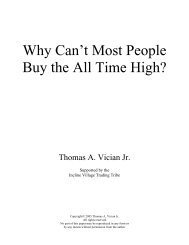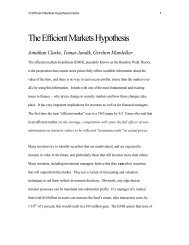Where the Money's Really Made: Louis Bacon - TurtleTrader
Where the Money's Really Made: Louis Bacon - TurtleTrader
Where the Money's Really Made: Louis Bacon - TurtleTrader
You also want an ePaper? Increase the reach of your titles
YUMPU automatically turns print PDFs into web optimized ePapers that Google loves.
<strong>Where</strong> <strong>the</strong> Money http://bear.cba.ufl.edu/demiroglu/fin4504fall2004/Articles/article21.htm<br />
half that kitty is said to be Cohen's personal wealth. Cherubic, balding, and about 5-foot-7, Cohen--or Stevie to<br />
his compadres--somewhat resembles <strong>the</strong> character George Costanza of Seinfeld. He is also said to be<br />
self-deprecating and a great dad. But Cohen, who started his career at <strong>the</strong> brokerage Gruntal & Co. (see "The<br />
Shabby Side of <strong>the</strong> Street" in <strong>the</strong> fortune.com archive), is also one of <strong>the</strong> world's most aggressive traders. He is<br />
security-conscious and secretive, and declined numerous requests for an interview. Getting anyone to speak<br />
about him on <strong>the</strong> record is next to impossible as well. One recent afternoon I called a former SACer named Scott<br />
Lederman, who sounded positively skittish. "I'd love to help you, but I can't," he said. "I've signed a<br />
confidentiality agreement. I just can't answer your questions."<br />
Though Cohen, like many o<strong>the</strong>r big-league players, operates out of southwestern Connecticut, he is<br />
considered something of an outlier because of his controversial trading strategies. He is a practitioner of what<br />
he has termed "information arbitrage." As best we can tell, that means trading in part on <strong>the</strong> thousands of bits<br />
and pieces of information that flash across Wall Street trading desks every day. Trouble is, many in <strong>the</strong> business<br />
say that in <strong>the</strong> pursuit of that information, SAC employs tactics to gain a competitive advantage. How so?<br />
Cohen's firm is said to generate as much as 1% of <strong>the</strong> average trading volume of <strong>the</strong> NYSE every day and<br />
<strong>the</strong>refore produces mammoth commissions for investment banks. For that, sources say, SAC traders expect<br />
<strong>the</strong> best information possible from <strong>the</strong> banks, including what is known on Wall Street as <strong>the</strong> first call. If a<br />
salesperson, for instance, has a large block of stock for sale, he may be strongly urged to offer it to SAC before<br />
any of its rivals. The practice isn't illegal, but it can lead to abuses. (Cohen declined to comment.) "Does Steve<br />
expect <strong>the</strong> first call?" asks a close associate. "Absolutely. And he would scream and yell if he didn't get it. I don't<br />
know of anything illegal going on. There aren't a lot of rules."<br />
Actually that's not quite right. There are rules. In fact, <strong>the</strong> Securities and Exchange Commission is investigating<br />
whe<strong>the</strong>r one of SAC's employees, Michael Zimmerman, received insider information about a possible<br />
downgrade of Amazon.com from his wife, Lehman Bro<strong>the</strong>rs analyst Holly Becker.<br />
Cohen's no-holds-barred style ruffles not only big institutional traders (who get beaten on trades) but also<br />
o<strong>the</strong>rs in his industry. Says a manager of a large, successful hedge fund: "If I see on a resume that <strong>the</strong> person<br />
worked at SAC, I won't even interview <strong>the</strong>m." Cohen's defenders say that kind of talk is envy. Last year SAC was<br />
up some 11%, while <strong>the</strong> market declined 22%. Unlike most o<strong>the</strong>r fund managers, Cohen passes on expenses<br />
to his limited partners-- between 2% and 3% of assets--and takes a whopping 25% to 50% of <strong>the</strong> profits for<br />
himself. (SAC is closed to new investors.)<br />
There are perhaps a dozen-and-a-half funds in this universe of nearly 6,000 investment partnerships that have<br />
more than 50 employees, says Phil Duff, former No. 2 man at Julian Robertson's Tiger fund and onetime CFO of<br />
Morgan Stanley. "The ones with a billion-plus--<strong>the</strong>y are in <strong>the</strong> big leagues," says Duff, who has since<br />
co-founded a hedge fund operation called FrontPoint.<br />
Ah, yes, <strong>the</strong> big leagues. That's <strong>the</strong> very top of <strong>the</strong> hedge fund pecking order, where a score or so of managers<br />
have amassed fortunes of hundreds of millions and in some cases billions. Mostly unknown to even <strong>the</strong> nation's<br />
top CEOs, publicity-allergic men like Moore Capital's <strong>Louis</strong> <strong>Bacon</strong>, Tudor Group's Paul Tudor Jones, and<br />
Stanley Druckenmiller of Duquesne Capital, as well as up-and- comers including Griffin and Steve Mandel lord<br />
over $5 billion and $10 billion pools of capital. In <strong>the</strong> business <strong>the</strong>y are known as <strong>the</strong> legends.<br />
Many of <strong>the</strong> legends worked at or have connections to Robertson's Tiger fund (see chart), which was a star<br />
performer before it closed in March 2000, a value fund victim of <strong>the</strong> tech-stock boom. The grandees' charity of<br />
choice is <strong>the</strong> Robin Hood Foundation, founded by Paul Jones, which, yes, takes from <strong>the</strong> rich and gives to New<br />
York City's poor.<br />
Even hedge funds with squeaky-clean reputations are notoriously secretive. No interviews. No pictures. No<br />
disclosure to anyone o<strong>the</strong>r than limited partners. Some of that is to protect trading positions. Some of it borders<br />
on <strong>the</strong> ludicrous. "My client called up this hedge fund he had a big chunk of money in to ask generally about its<br />
positions," says a fund-of-funds manager, "and <strong>the</strong>y basically told him, 'None of your business.' And it was his<br />
money!" While that particular anecdote may sound indefensible, <strong>the</strong> recent kidnapping in Greenwich, Conn., of<br />
hedge fund manager Eddie Lampert has helped reinforce <strong>the</strong> group's craving for privacy. In case you haven't<br />
3 of 5 12/13/04 11:08 PM




